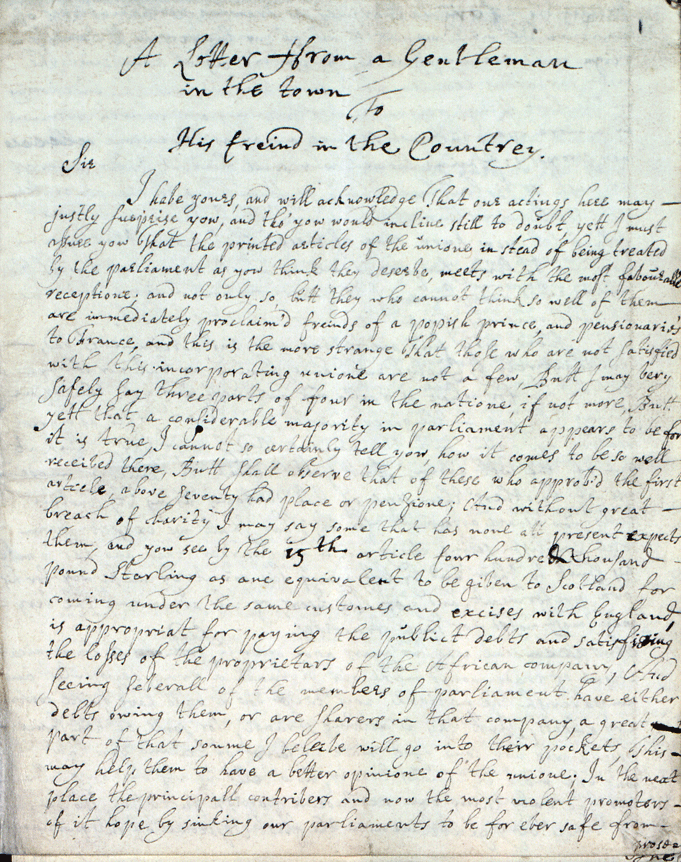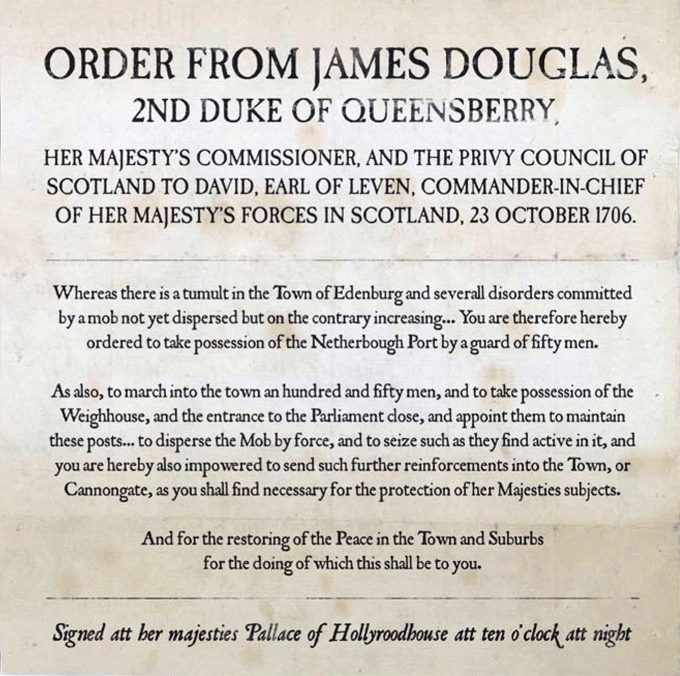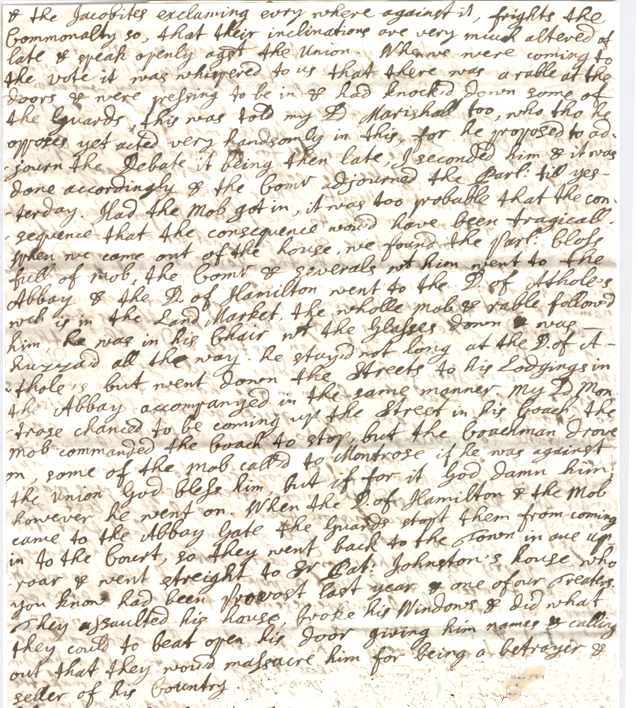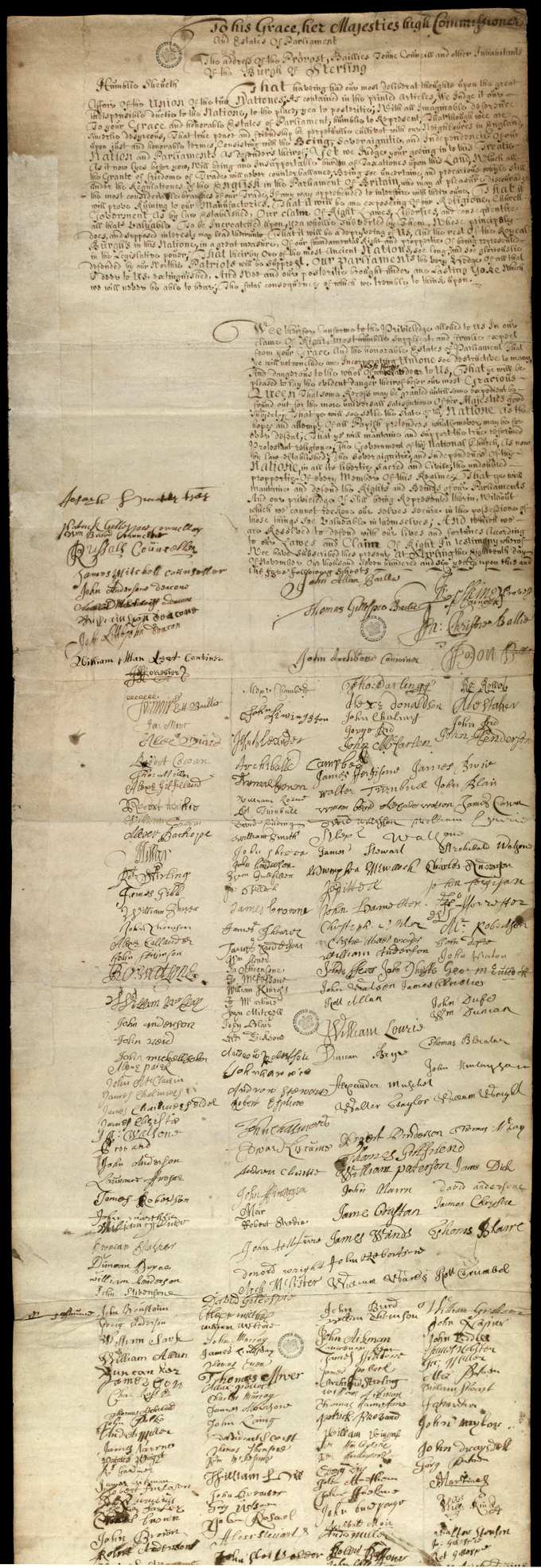| | Home | Resources | Schools Programme | Teachers | Site help | About us | Contact us | |
| You are here: Home > Resources >The Union of 1707 > Opinions against Union |
Opinions against UnionWhile there were certainly those in Parliament who favoured closer ties with England, the majority of people whose opinions have been recorded were against the proposed incorporating union. Some unionist contemporaries also admitted and reflected on this national feeling. For example, in his history of the making of the Union, the unionist Sir John Clerk of Penicuik (burgh commissioner in Parliament for Whithorn) wrote: The next business before parliament was a vast number of petitions from various shires and towns. Notable was one from the Commissioners to the General Convention of the Royal Burghs against a so-called incorporating union, and others to the same purpose from the shires of Fife and Renfrew and the towns of Hamilton and Falkland. The reading of all these was a mere formality now that members had made up their minds. Sad examples appeared every day of how widely parliament and people had diverged, for not even one per cent approved what the former was doing. (Sir John Clerk of Penicuik, History of the Union of Scotland and England, trans. and ed. Douglas Duncan (Edinburgh: Scottish History Society, 1993), p. 118.) The mentioned petitions are recorded at Records of the Parliaments of Scotland to 1707, RPS 1706/10/45, 6 November 1706. This petitioning campaign was unusually inclusive for the time, attracting over 20,000 signatures. Evidence shows that it was orchestrated by political elites but willingly signed in the localities. (All 80 petitions against the treaty of union can be seen in Karin Bowie, Addresses against Incorporating Union, 1706-1707 (Woodbridge: Scottish History Society, 2018) ) Although today it is thought that Penicuik may have exaggerated anti-union sentiment at 99%, opposition was strong, and vocal, in some places notably Edinburgh. Despite this, a majority was achieved in Parliament for the treaty; support for union came from army officers and others with Crown offices, nobles with English estates, elite overseas traders in Glasgow, Aberdeen and Edinburgh and moderate Presbyterians who sought security from the Jacobite threat through a British Union, and were encouraged by promises of favour and secret payments of Crown office salary arrears. Many traders, however, anticipated economic disadvantage from higher taxes in the Union on goods such as coal, salt, malt and ale, and most Presbyterians feared that the Anglican majority in a British parliament would vote to encroach upon the Presbyterian Church of Scotland. (This is shown in Christopher Whatley, The Scots and the Union, (2006) and Karin Bowie, Scottish Public Opinion and the Anglo-Scottish Union, 1699-1707 (2007) ) Will Scotland lose her identity? |
||||
Will Scotland lose her identity?The Reverend Robert Wodrow, a minister at Eastwood near Glasgow, feared that Scotland would not be treated on equal terms by England and would suffer from the union. He wrote many letters expressing his strong views against it taking place. To George Ridpath in London, 30 May 1706. (Early letters of Robert Wodrow, 1698–1709, ed. L. W. Sharp, Scottish History Society, 3rd ser., 24 (1937), pp.290-291) |
||||
| ||||
Hints of BriberyIt was a common convention at the time for writers or other interested commentators to publish letters from imaginary people as a way of publicising their particular views on a subject. Just such a letter appeared in Edinburgh in December 1706. The writer was clearly opposed to union and hints at suspicions that politicians and those in power were being offered senior positions or money in return for their support for full Parliamentary union. … those who are not satisfied with this incorporating unione are not a few, Butt I may very safely say three parts of four in the natione, if not more. Butt yett a considerable majority in Parliament appears to be for it, is true. I cannot so certainly tell you how it comes to be so well received there, Butt shall observe that of these who approv’d the first article, above seventy had place or pensione; And without great breach of charity I may say some that has none att present expects them. 
(National Records of Scotland, Hamilton papers, GD406/M1/253/14) | ||||
Public reactions to the proposed unionFeelings ran high among the ordinary citizens of Scotland. There were riots in Edinburgh and Glasgow and the Articles of Union were burned in several towns. Troops were brought into Edinburgh to maintain order and forces were mustered near the English border in case of further unrest. 
(National Records of Scotland, Leven and Melville papers, GD26/7/124. By kind permission of the Earl of Leven.) | ||||
Riots in EdinburghThe Earl of Mar described the riot in a letter to Sir David Nairne, dated 26 October 1706. The session of Parliament had been stopped because the mob was threatening to break in. The crowd had cheered the Duke of Hamilton as an opponent of union but they had attacked the house of Sir Patrick Johnston, a commissioner for union and former Lord Provost of Edinburgh. The Earl of Mar wrote When we were coming to the vote, it was whispered to us that there was rable at the doors & were pressing to be in & had knocked down some of the Guards... we found the Parliament Close full of the mob. The Commissioner & severals with him went to the Abbay & the Duke of Hamilton went to the Duke of Athole’s which is in the Land Market. The wholle mob & rable followed him. He was in his Chair with the Glasses down and was huzza’d all the way... 
(National Records of Scotland, Mar and Kellie papers, GD124/15/449/44) | ||||
Public protestsParliament received a total of 97 anti-union addresses from parishes, counties and burghs in Scotland. 14 out of 34 shires, 20 out of 66 burghs, 60 out of 938 parishes and three out of 68 presbyteries delivered their petitions. On 18 November 1706, the royal burgh of Stirling sent this petition expressing their concern at the prospect of increased taxes and a growing threat to the Scottish economy and way of life. This extract is taken from the petition from the royal burgh of Stirling. … though wee are sincerlie desyreous That true peace and friendship be perpetuallie cultivat with our Neighboures in England, upon just and honorable terms.... Yet we Judge your goeing in to this Treatie as it now lyes befor you, Will bring ane Insupportable burden of Taxationes upon this Land, Which all the Grante of friedome of Trade will never counterbalance being soe uncertaine and precarious whyle still under the Regulationes of the English in the Parliament of Britain, who may at pleasure discouradge the most considerable branches of our Trade, if any was apprehended to interfeire with their oune. 
(National Records of Scotland, Parliamentary papers, PA7/28/48) | ||||
The concerns of Edinburgh schoolboysHugh Nisbet, a pupil at the High School in the Canongate, wrote to the Duke of Hamilton on behalf of his school to express their views against union. The students begged the Duke to consider the good of the nation and oppose it. We, to wit the boys of the hay [high] school of the Cannongate… giving the union diligent consideration, we find that it will be fore the ruin and destruction of the whol nation... So therfor my Lord we having got wit that you are the treuest nobleman for the countre in all that mighty house... do begge and intrate your grace that you will be as diligent conserning this afair as posable you can for it conserns the good of the whol nation… (National Records of Scotland, Hamilton papers, GD406/M9/247/18) | ||||
|
|